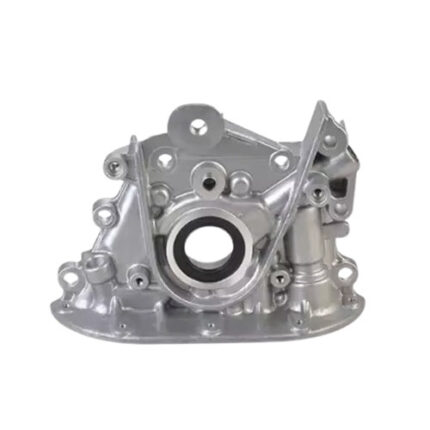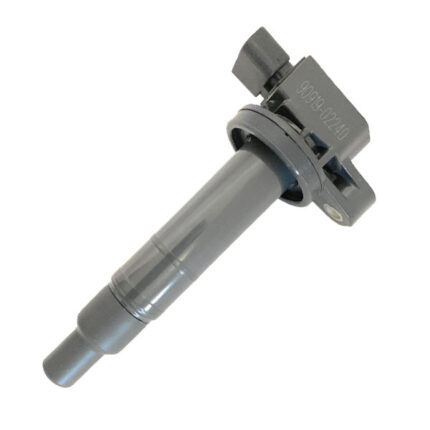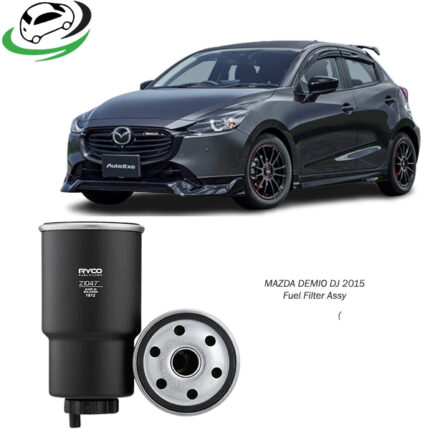-20%
Get Mazda Demio DJ / CX-3 Diesel Fuel Filter Assy S51C-13-ZA5
A diesel fuel filter assembly is a crucial component in any diesel-powered vehicle. Its primary role is to filter out impurities and contaminants from the fuel before it enters the engine. Diesel fuel, like any fuel, can contain dirt, water, and other particles that, if not removed, can harm the engine. The diesel fuel filter assembly helps ensure the engine runs smoothly and efficiently by providing clean fuel to the engine’s combustion system. In this detailed explanation, we will explore the functions, types, benefits, and maintenance tips of diesel fuel filter assemblies.
Function of a Diesel Fuel Filter Assembly
The diesel fuel filter assembly performs several key functions, all centered around protecting the engine from damage caused by contaminants in the fuel. Diesel engines, in particular, are sensitive to impurities in fuel, as they rely on high-pressure fuel injection systems to operate efficiently. Even tiny particles of dirt or water can have a significant impact on performance, leading to problems like injector wear, decreased fuel efficiency, and even engine failure.
1. Filtering Contaminants
The primary role of the diesel fuel filter assembly is to remove contaminants such as dirt, rust, and debris from the fuel before it enters the engine. Diesel fuel can pick up impurities during storage, transportation, or even at the fuel station. If these impurities make their way into the engine, they can cause clogging of the fuel injectors, leading to poor fuel atomization and inefficient combustion.
2. Water Separation
One of the most critical functions of a diesel fuel filter assembly is water separation. Diesel fuel is more likely to absorb water than gasoline, which can lead to corrosion in the fuel system and damage to fuel injectors. Water in the fuel can also cause poor combustion, engine misfires, and, in extreme cases, complete engine failure. Diesel fuel filters often have built-in water separators to remove water from the fuel before it reaches the engine. This ensures that only clean, dry fuel is delivered to the combustion chamber.
3. Regulating Fuel Pressure
Diesel fuel filters also play a role in regulating the fuel pressure within the fuel system. By ensuring that the fuel is free from contaminants and water, the filter assembly allows for smooth fuel flow and proper fuel pressure, which is critical for the high-pressure fuel injection systems used in diesel engines. A clogged or dirty filter can restrict fuel flow, causing a drop in fuel pressure and resulting in poor engine performance or difficulty starting the vehicle.
Components of a Diesel Fuel Filter Assembly
A diesel fuel filter assembly is made up of several components that work together to ensure the delivery of clean fuel to the engine.
1. Filter Element
The filter element is the core component of the fuel filter assembly. It is typically made from a combination of paper, synthetic fibers, or cellulose, and it is responsible for trapping dirt, rust, and other contaminants in the fuel. The filter element is designed to allow fuel to pass through while capturing impurities, ensuring that only clean fuel reaches the engine.
2. Water Separator
The water separator is another essential part of the fuel filter assembly in diesel engines. This component removes water from the diesel fuel, preventing it from reaching the engine. Water separators are designed with a collection chamber where water can settle, allowing the fuel to pass through to the engine. Many diesel fuel filters have a drain valve to manually remove the collected water.
3. Housing
The filter element and water separator are encased in a protective housing. The housing protects the filter components from external damage and ensures that the filter operates effectively. It is usually made of durable materials such as metal or plastic to withstand the harsh conditions of the engine bay.
4. Fuel Heater (Optional)
In colder climates, diesel fuel can gel, making it difficult to flow through the fuel system. Some diesel fuel filter assemblies come with built-in fuel heaters to prevent gelling by warming the fuel as it passes through the filter. This ensures smooth fuel flow and helps maintain engine performance in cold weather.
Types of Diesel Fuel Filter Assemblies
There are different types of diesel fuel filter assemblies used in vehicles, depending on the make and model of the vehicle as well as the specific requirements of the engine.
1. Primary Fuel Filter
The primary fuel filter is the first line of defense in the fuel system. It is typically located between the fuel tank and the fuel pump, and its job is to filter out larger particles and contaminants before the fuel reaches the fuel pump. The primary filter usually has a coarser filter media to handle larger debris.
2. Secondary Fuel Filter
The secondary fuel filter, also known as the fine filter, is located between the fuel pump and the fuel injectors. This filter is designed to capture finer particles that the primary filter may have missed. The secondary fuel filter ensures that only the cleanest fuel reaches the injectors, which is critical for the precise operation of the high-pressure fuel injection system in diesel engines.
3. Spin-On Filters
Spin-on filters are a type of diesel fuel filter assembly that is easy to replace. The entire filter unit is replaced during maintenance, making it a convenient option for quick and easy servicing. Spin-on filters are commonly used in both primary and secondary filtration stages.
4. Cartridge Filters
Cartridge filters consist of a replaceable filter element housed in a permanent casing. When it’s time for maintenance, only the filter element is replaced, reducing waste. Cartridge filters are often found in modern diesel vehicles and offer an environmentally friendly option for fuel filtration.
Benefits of a Diesel Fuel Filter Assembly
1. Prolongs Engine Life
The most significant benefit of a diesel fuel filter assembly is its ability to prolong engine life. By filtering out harmful contaminants and water from the fuel, the filter assembly protects the fuel injectors, fuel pump, and other critical engine components from damage. Clean fuel ensures efficient combustion, which reduces wear and tear on the engine and helps it operate smoothly for longer.
2. Improves Fuel Efficiency
A well-functioning fuel filter assembly ensures that the engine receives a consistent flow of clean fuel, which leads to more efficient combustion. When the engine burns fuel efficiently, it requires less fuel to produce the same amount of power, resulting in better fuel economy. In contrast, a clogged or dirty fuel filter can reduce fuel efficiency by restricting fuel flow and causing the engine to work harder.
3. Prevents Engine Damage
Contaminated fuel can cause severe damage to the fuel injectors and fuel pump, leading to costly repairs or even engine failure. Diesel fuel filters prevent this by trapping dirt, rust, and water before they reach the engine. This reduces the likelihood of damage to the fuel system and ensures that the engine operates reliably.
4. Reduces Emissions
Diesel engines are known for producing more emissions than gasoline engines, but clean fuel can help reduce harmful exhaust emissions. A properly maintained diesel fuel filter assembly ensures that the engine burns fuel more completely and efficiently, which results in lower levels of pollutants such as soot and nitrogen oxides (NOx) being released into the atmosphere.
Maintenance of Diesel Fuel Filter Assemblies
1. Regular Replacement
One of the most important aspects of maintaining a diesel fuel filter assembly is regular replacement. Over time, the filter element becomes clogged with contaminants, reducing its ability to filter fuel effectively. It is recommended to replace the fuel filter according to the vehicle manufacturer’s maintenance schedule, which is usually every 10,000 to 30,000 miles, depending on driving conditions.
2. Checking for Water Buildup
Diesel fuel filters with water separators should be regularly checked for water buildup. Many filters have a transparent bowl or a warning indicator to show when water has accumulated. If water is present, it should be drained promptly using the drain valve to prevent water from reaching the engine.
3. Using High-Quality Fuel Filters
It is essential to use high-quality, OEM (original equipment manufacturer) or equivalent fuel filters for your vehicle. Low-quality filters may not provide adequate filtration or may break down quickly, leading to fuel contamination and engine damage.
4. Monitor for Signs of a Clogged Filter
Drivers should be aware of the signs of a clogged or failing fuel filter. Symptoms such as difficulty starting the engine, rough idling, reduced power, or poor fuel efficiency can all indicate that the fuel filter needs to be replaced. Regularly checking the fuel filter and replacing it as needed can help prevent more serious issues from developing.
Conclusion
A diesel fuel filter assembly is a vital component in maintaining the health and efficiency of a diesel engine. By filtering out contaminants and water from the fuel, the filter assembly protects the engine from damage, improves fuel efficiency, reduces emissions, and extends the engine’s lifespan. Regular maintenance of the fuel filter assembly, including timely replacement and monitoring for water buildup, is essential for ensuring that the engine operates smoothly and reliably. Vehicle owners who prioritize proper fuel filter care will benefit from improved engine performance, lower fuel costs, and reduced maintenance expenses.
Follow us on Facebook for more parts.




